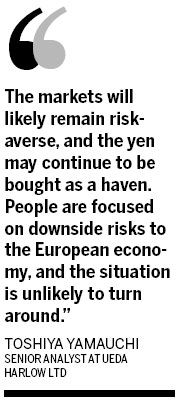Japan's yen gains on trade surplus as euro weakens
The yen rose against all of its major peers as data showing Japan returned to a current-account surplus and tensions over a rocket launch on the Korean Peninsula bolstered the allure of the currency as an investment haven.
The euro touched a one-month low versus the Japanese currency before a German report that may show exports declined in February. The dollar weakened against the yen before data this week that may show inflation in the United States eased. The Swiss franc strengthened above the 1.20 ceiling against the euro imposed by the nation's central bank, spurring speculation the country will intervene to weaken the currency.
"The markets will likely remain risk-averse, and the yen may continue to be bought as a haven," said Toshiya Yamauchi, a senior analyst in Tokyo at Ueda Harlow Ltd, which provides currency margin-trading services. "People are focused on downside risks to the European economy, and the situation is unlikely to turn around."
The yen climbed to 106.18 per euro, the strongest since March 7, before trading at 106.38 at 6:36 am in New York, 0.4 percent higher than the close at the end of last week. Japan's currency added 0.3 percent to 81.36 per dollar after reaching 81.20 earlier, the strongest since March 8. The euro slid 0.2 percent to $1.3076.
Markets in Australia, New Zealand and the United Kingdom were closed on Monday for a public holiday.
Japan had a 1.18-trillion-yen ($14.5 billion) surplus in its February current account, the widest measure of trade, government data showed on Monday. That was after a record deficit in the January account and compared with the surplus of 1.12 trillion yen estimated by economists.
The yen tends to strengthen during economic and geopolitical turmoil because Japan's current-account surplus makes it less reliant on foreign capital.
Weakening economy

Exports from Germany, the eurozone's biggest economy, probably decreased 1.2 percent in February from the prior month, when they rose 2.4 percent, a Bloomberg News survey of economists showed before the report.
"The European economy is weak," said Kumiko Gervaise, an analyst in Tokyo at Gaitame.com Research Institute Ltd, a unit of Japan's largest online currency margin-trading company. "The German economy is getting weaker than before. Bad data from Germany may contribute to euro weakness."
US consumer prices advanced 0.3 percent last month after climbing 0.4 percent in February, according to a separate survey before the US Labor Department's April 13 release. It reported last week that nonfarm payrolls increased by 120,000 in March, the smallest gain in five months.
The Federal Reserve has pledged to keep its key interest rate at a record low range of zero to 0.25 percent through 2014. It will hold off on increasing monetary accommodation unless the US economic expansion falters or prices rise at a rate slower than its target, according to minutes of the central bank's March 13 meeting released April 3.
The central bank bought $2.3 trillion of securities in two rounds of so-called quantitative easing from December 2008 to June 2011 to stimulate the economy through lower borrowing costs.
Ichimoku chart
The dollar may slide this week to upper 80-yen levels, which are on the conversion line of its weekly ichimoku chart and the top line of the so-called cloud, analysts at Bank of Tokyo-Mitsubishi UFJ Ltd wrote in a note on Monday. The conversion line stood at 80.77, while the upper end of the cloud was at 80.68, according to data compiled by Bloomberg.
The yen has weakened almost 5 percent against the dollar since the Bank of Japan set a 1 percent inflation goal on Feb 14 and increased its planned purchases of government bonds.
The quarterly Tankan survey from the BOJ last week showed no improvement in sentiment among large manufacturers. At its March 13 meeting, the BOJ board voted down a proposal from one of the members, Ryuzo Miyao, to expand the central bank's asset-purchase fund to ease policy further.
'Further easing'
"With Japan's Tankan survey surprising to the downside and political pressure rising, other board members may soon consider joining Miyao-san in favoring further easing," Mansoor Mohi-uddin, the Singapore-based chief currency strategist at UBS AG, wrote in an e-mailed note on April 7.
Futures traders remained the most bearish on the yen in more than four years, according to figures from the Washington-based Commodity Futures Trading Commission.
The difference in the number of wagers by large speculators on a decline in the yen against the dollar compared with those on a gain was 65,108 on April 3. So-called net shorts reached 67,622 the previous week, the most since July 2007.
The franc reached 1.19962 per euro on Monday, the strongest since the Swiss National Bank set the limit on Sept 6. The SNB won't allow the franc to rise above the ceiling and is ready to buy foreign currencies in "unlimited quantities," spokesman Walter Meier said on Thursday.
"We believe the SNB is serious in its commitment to maintain the floor and will aggressively defend it," Yuki Sakasai and Aroop Chatterjee, currency strategists at Barclays Capital, wrote in a research note on Friday. The Swiss franc is "an attractive funding currency for risky asset positions."
Bloomberg News in Singapore and Tokyo
(China Daily 04/10/2012 page17)














